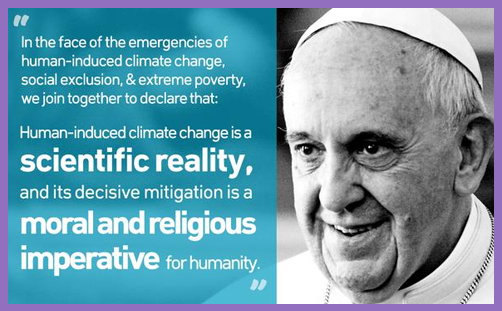“Where were you when I laid the foundation of the earth? Tell Me, if you have understanding, Who set its measurements? Since you know. Or who stretched the line on it? On what were its bases sunk? Or who laid its cornerstone, When the morning stars sang together And all the sons of God shouted for joy?” [Job 38:4-7, NRSV]
The itinerary of the document
In contents as well as in method, Laudato Si’ is in line with all Catholic Social Teachings of which it forms a part [No.15]. So contents-wise, the encyclical reflects the four permanent principles of Catholic Social Teaching: dignity of the human person; solidarity in relationships and communities; working for the Common good: with preferential option for the poor, and stewardship for all creation; and promoting subsidiarity. These four permanent principles of Catholic Social Teaching stand as our guide as we read the text.
In its format, the encyclical features an itinerary mapped out in paragraph 15. Following the see-judge-act method of Catholic Social Teaching which originated from the movement of the young Catholic Workers in Europe of the early twentieth century and adopted by Pope John XXIII in 1963, this itinerary is set out in rich details over six chapters.
[a] The “see” stage begins in chapter 1
Titled “What is happening to our common home,” the text takes stock of the reality in the world. Issuing a wake-up call on our ecological crisis, it presents “several aspects of the present ecological crisis” [No.15].
Readers quickly notice that Pope Francis, in keeping with his straightforward manner of dealing with issues, “tiresome and abstract” theological and philosophical reflections, and goes straight to down to earth facts. As he insists that “facts are more important than ideas,” we see the hands-on, down-to-earth Jesuit Pastor at work, which is quite different from his two predecessors. The Roman Catholic Church, present in every corner of the globe, is ideally poised to gather facts on the ground, and this encyclical is “grounded in a fresh analysis of our present situation” [No.17].
On the one hand, Pope Francis presents the current situation based on the best scientific findings available today. He does so as a way to listen to the cry of creation, “to become painfully aware, to dare to turn what is happening to the world into our own personal suffering and thus to discover what each of us can do about it” [No.19]. Where critics seemingly take offence at the Church putting its fingers into science, of which it is said to know nothing about, such criticisms are nothing if not superficial. They ignore the fact that this Church has millions of scientists amongst its membership. Doing science is just part of the Church’s regular routine really.
On the other hand, we are invited to open our eyes, look around, and see for ourselves what’s going on in the world. Taking judicious notice of the reality around the globe, Pope Francis talks about a “rapidification” in human pace of life and work, which is neither in tune with the slow pace of change in evolution nor for the common good. He talks about pollution, waste and the throwaway culture. Excessive use of fossil fuels comes into scrutiny, so do the climate change, water crisis, the loss of bio-diversity, deforestation, our failure to respond to economic crisis, global inequality, and the effects of all this on the Poor, environmental and social degradation, precipitating migration and “uncertain future” [No.25], etc. And in light of this, he talks about a “grave social debt” towards the Poor [No.30], and an “ecological debt” owed by the global north to the global south [No.51, 52].
We do not expect the rich and the rich global north to queue up to kiss the Pope’s hands any time soon for saying all that. So of course there are going to be divergent views and people are going to continue to argue whether the current phenomena of climate change is scientifically proven to have actually been caused by global warming or not. But, no one who takes a “frank look at the facts”, the Pope says, can seriously deny that “our common home is falling into serious disrepair” [No.60], and that “the earth, our home, is beginning to look more and more like an immense pile of filth” [No.21].
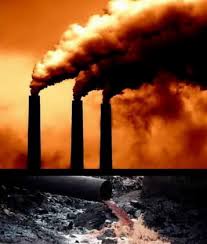
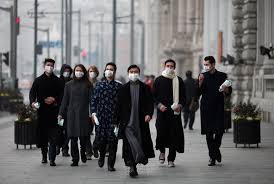 City-dwellers facing constant air pollution.
City-dwellers facing constant air pollution.
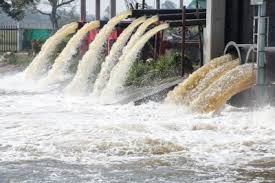
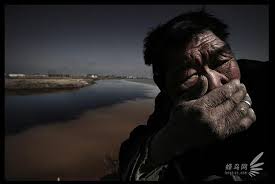 An elderly shepherd by the Yellow River cannot stand the stench.
An elderly shepherd by the Yellow River cannot stand the stench.
On pollution and climate change:
- “Climate change is a global problem with serious implications, environmental, social, economic, political and for the distribution of goods; it represents one of the principal challenges facing humanity in our day” [No.25].
- If “the climate is a common good, belonging to all and meant for all” [No.23], the greatest impact of this change falls on the poorest, but “many of those who possess more resources and economic or political power seem mostly to be concerned with masking the problems or concealing their symptoms” [No.26].
- At the same time, “our lack of response to these tragedies involving our brothers and sisters points to the loss of that sense of responsibility for our fellow men and women upon which all civil society is founded” [No.25].
Pope Francis makes a dire conclusion: “If we can scan the regions of the planet, we immediately see that humanity has disappointed God’s expectations” [No.61]. This must prompt us to ask: Who are we? What is the purpose of our work? What is the goal of our activities? Our common home has fallen into serious disrepair; and yet, we have stopped thinking about these questions. We have seriously disappointed God.
[b] Then he moves into the “judge” stage in chapters 2, 3 and 4
He goes deeper into the reality.
Chapter 2 on “Gospel of Creation” gives a review of the Christian faith in the Bible and the Judeo-Christian tradition. Starting with the Book of Genesis, going all the way through the Bible, he uses Scriptures as basically a template to get to what Jesus Christ reveals for believers to the most basic questions at hand concerning our existence on this earth.
In the Bible, “the God who liberates and saves is the same God who created the universe, and these two divine ways of acting are intimately and inseparably connected” [No.73]. The story of creation is central for reflecting on the relationship between human beings and other creatures and on how sin breaks the equilibrium of all creation in its entirety: “These accounts suggest that human life is grounded in three fundamental and closely intertwined relationships: with God, with our neighbour and with the earth itself. According to the Bible, these three vital relationships have been broken, both outwardly and within us. This rupture is sin” [No.66].
In a simple but vehement way, Pope Francis restates a fundamental Christian creation doctrine: “We are not God. The earth was here before us and it has been given to us” [No.67].
The chapter concludes with the heart of Christian revelation:
- “The New Testament does not only tell us of the earthly Jesus and his tangible and loving relationship with the world. It also shows him risen and glorious, present throughout creation by his universal Lordship” [No.100].
Chapter 3 looks at the human roots of the ecological crisis. Insights on three crucial items relative to the spirit of modernity are brought to bear to expose the root of the problems:
- [i] “Modernity has been marked by an excessive anthropocentrism” [No.116]: human beings no longer recognize their right place with respect to the world and take on a self-centred position, focused exclusively on themselves and on their own power. Actions of human beings are having a severely negative effect on the planet and also on the poor. Excessive human self-centeredness is exposed as standing at the origin of the crisis in both the environmental and social ecology.
- [ii] “The intrinsic dignity of the world is thus compromised” because in modern anthropocentrism, technical thought is prized over reality. The “technological mind sees nature as an insensate order, as a cold body of facts, as a mere ‘given’, as an object of utility, as raw material to be hammered into useful shape; it views the cosmos similarly as a mere ‘space’ into which objects can be thrown with complete indifference” [No.115].
- [iii] Our “immense technological development has not been accompanied by a development in human responsibility, values and conscience. Each age tends to have only a meagre awareness of its own limitations” [No.105]. The culture and mentality of technocracy developed over the last 200 years is seriously injurious to the ecology and humanity. The Pope’s critique of this “technocratic paradigm” deserves to be closely studied.
Chapter 4 is where he starts to propose a different model, an “integral ecology which clearly respects its human and social dimensions” [No.137] and is inextricably linked to the environmental question. We will also take a closer look at this “integral ecology” in a later post.
[c] Finally, he comes to the “act” stage in chapters 5 and 6
Here, the encyclical moves from an analysis of the reality and the deeper reflections of what stands behind the problem, to the proposals for action.
In chapter 5, he lays out the political and cultural responses that are needed. We need good leaders who can effectively respond to the climate crisis and the problems facing people who are poor. We can get caught up into thinking how to win the next election and not think about future generations. We need norms and regulations to regulate the economy and our relationship with the environment. Pope Francis proposes to initiate an honest dialogue at every level of social, economic and political life, that builds transparent decision-making processes.
In chapter 6, he talks about educational and spiritual responses. He says very clearly that laws and policies are useless if they are not accompanied by a change of lifestyle. Recalling that no project can be effective if it is not animated by a formed and responsible conscience, ideas are put forth to aid growth in this direction at the educational, spiritual, ecclesial, political and theological levels.
Copyright © Dr. Jeffrey & Angie Goh, September 2015. All rights reserved.
You are most welcome to respond to this post. Email your comments to jeffangiegoh@gmail.com. You can also be dialogue partners in this Ephphatha Coffee-Corner Ministry by sending us questions for discussion.

